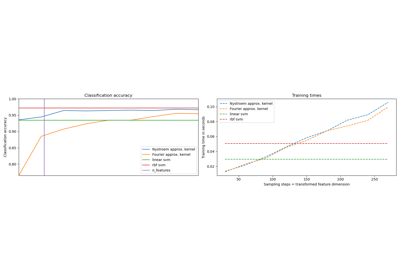W3cubDocs
/scikit-learnsklearn.kernel_approximation.Nystroem
-
class sklearn.kernel_approximation.Nystroem(kernel='rbf', gamma=None, coef0=1, degree=3, kernel_params=None, n_components=100, random_state=None)[source] -
Approximate a kernel map using a subset of the training data.
Constructs an approximate feature map for an arbitrary kernel using a subset of the data as basis.
Read more in the User Guide.
Parameters: kernel : string or callable, default=”rbf”
Kernel map to be approximated. A callable should accept two arguments and the keyword arguments passed to this object as kernel_params, and should return a floating point number.
n_components : int
Number of features to construct. How many data points will be used to construct the mapping.
gamma : float, default=None
Gamma parameter for the RBF, polynomial, exponential chi2 and sigmoid kernels. Interpretation of the default value is left to the kernel; see the documentation for sklearn.metrics.pairwise. Ignored by other kernels.
degree : float, default=3
Degree of the polynomial kernel. Ignored by other kernels.
coef0 : float, default=1
Zero coefficient for polynomial and sigmoid kernels. Ignored by other kernels.
kernel_params : mapping of string to any, optional
Additional parameters (keyword arguments) for kernel function passed as callable object.
random_state : {int, RandomState}, optional
If int, random_state is the seed used by the random number generator; if RandomState instance, random_state is the random number generator.
Attributes: components_ : array, shape (n_components, n_features)
Subset of training points used to construct the feature map.
component_indices_ : array, shape (n_components)
Indices of
components_in the training set.normalization_ : array, shape (n_components, n_components)
Normalization matrix needed for embedding. Square root of the kernel matrix on
components_.See also
-
RBFSampler - An approximation to the RBF kernel using random Fourier features.
-
sklearn.metrics.pairwise.kernel_metrics - List of built-in kernels.
References
- Williams, C.K.I. and Seeger, M. “Using the Nystroem method to speed up kernel machines”, Advances in neural information processing systems 2001
- T. Yang, Y. Li, M. Mahdavi, R. Jin and Z. Zhou “Nystroem Method vs Random Fourier Features: A Theoretical and Empirical Comparison”, Advances in Neural Information Processing Systems 2012
Methods
fit(X[, y])Fit estimator to data. fit_transform(X[, y])Fit to data, then transform it. get_params([deep])Get parameters for this estimator. set_params(**params)Set the parameters of this estimator. transform(X)Apply feature map to X. -
__init__(kernel='rbf', gamma=None, coef0=1, degree=3, kernel_params=None, n_components=100, random_state=None)[source]
-
fit(X, y=None)[source] -
Fit estimator to data.
Samples a subset of training points, computes kernel on these and computes normalization matrix.
Parameters: X : array-like, shape=(n_samples, n_feature)
Training data.
-
fit_transform(X, y=None, **fit_params)[source] -
Fit to data, then transform it.
Fits transformer to X and y with optional parameters fit_params and returns a transformed version of X.
Parameters: X : numpy array of shape [n_samples, n_features]
Training set.
y : numpy array of shape [n_samples]
Target values.
Returns: X_new : numpy array of shape [n_samples, n_features_new]
Transformed array.
-
get_params(deep=True)[source] -
Get parameters for this estimator.
Parameters: deep: boolean, optional :
If True, will return the parameters for this estimator and contained subobjects that are estimators.
Returns: params : mapping of string to any
Parameter names mapped to their values.
-
set_params(**params)[source] -
Set the parameters of this estimator.
The method works on simple estimators as well as on nested objects (such as pipelines). The latter have parameters of the form
<component>__<parameter>so that it’s possible to update each component of a nested object.Returns: self :
-
transform(X)[source] -
Apply feature map to X.
Computes an approximate feature map using the kernel between some training points and X.
Parameters: X : array-like, shape=(n_samples, n_features)
Data to transform.
Returns: X_transformed : array, shape=(n_samples, n_components)
Transformed data.
-
Examples using sklearn.kernel_approximation.Nystroem
© 2007–2016 The scikit-learn developers
Licensed under the 3-clause BSD License.
http://scikit-learn.org/stable/modules/generated/sklearn.kernel_approximation.Nystroem.html
